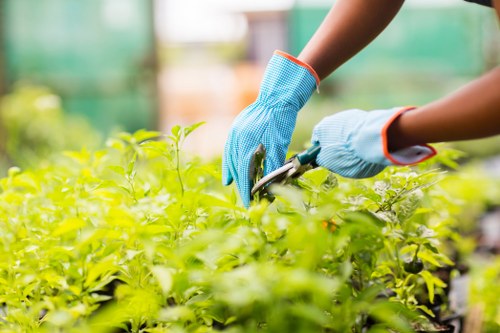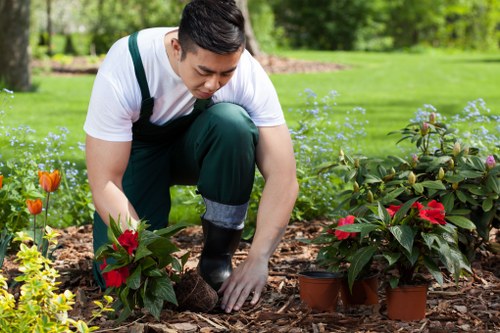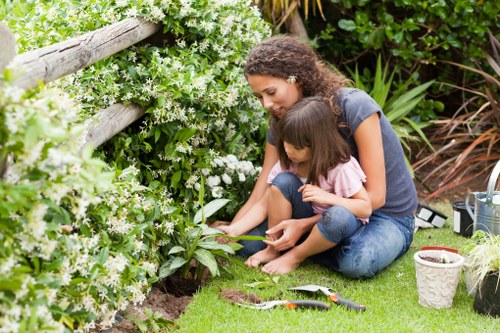Garden Maintenance in Southgate

Introduction to Garden Maintenance
Maintaining a beautiful garden in Southgate requires dedication, knowledge, and the right resources. Whether you're a seasoned gardener or a beginner, understanding the essential aspects of garden maintenance will help you achieve a thriving outdoor space.
Southgate's unique climate and soil conditions offer both opportunities and challenges for garden enthusiasts. Proper maintenance ensures that your plants remain healthy, vibrant, and resilient against seasonal changes.
In this article, we'll explore comprehensive strategies and tips for effective garden maintenance in Southgate, covering everything from foundational gardening practices to specialized care techniques.

Seasonal Garden Maintenance
Spring Maintenance
Spring is a crucial time for garden maintenance in Southgate. As the weather warms, plants come back to life, and it's essential to prepare your garden for the growing season.
Key Tasks:
- Clearing debris and dead plants from winter
- Pruning overgrown shrubs and trees
- Soil testing and amending as necessary
Implementing these tasks in spring sets the foundation for a lush and vibrant garden throughout the year.

Regular Garden Care Practices
Watering Strategies
Effective watering is vital for maintaining a healthy garden. Southgate's climate can be unpredictable, so it's important to adapt your watering schedule accordingly.
Tips for Optimal Watering:
- Water early in the morning to reduce evaporation
- Use drip irrigation systems for targeted moisture
- Monitor soil moisture levels regularly
Consistent and appropriate watering practices help prevent plant stress and promote robust growth.

Pest and Disease Management
Identifying Common Pests
Pests can pose significant threats to your garden's health. Recognizing and addressing pest issues promptly is essential for sustainable garden maintenance.
Common Garden Pests in Southgate:
- Aphids
- Slugs and snails
- Japanese beetles
Implementing integrated pest management (IPM) strategies can help control pest populations effectively while minimizing environmental impact.

Choosing the Right Plants
Native vs. Non-native Plants
Selecting appropriate plant species is fundamental to garden success. Native plants are well-suited to Southgate's environment and require less maintenance.
Advantages of Native Plants:
- Better resilience to local climate
- Attract local wildlife and pollinators
- Reduced need for chemical interventions
Incorporating a mix of native and non-native plants can create a diverse and sustainable garden ecosystem.

Soil Health and Fertilization
Understanding Soil Composition
Healthy soil is the cornerstone of a thriving garden. Understanding the composition of your soil in Southgate helps in selecting the right plants and fertilization methods.
Soil Testing: Conduct regular soil tests to determine pH levels and nutrient content.
Fertilization Tips:
- Use organic fertilizers to enrich soil naturally
- Apply fertilizers during the growing season for optimal absorption
- Avoid over-fertilizing, which can harm plants and the environment

Lawn Care Essentials
Mowing Techniques
A well-maintained lawn enhances the overall aesthetics of your garden. Proper mowing techniques contribute to a healthy and lush lawn.
Best Practices:
- Mow at the right height for your grass type
- Keep mower blades sharp to ensure clean cuts
- Vary mowing patterns to prevent soil compaction
Regular mowing, combined with adequate watering and fertilization, keeps your lawn green and resilient.

Pruning and Trimming
Why Pruning is Important
Pruning helps maintain plant health, encourages growth, and enhances the shape and appearance of your garden plants.
Pruning Tips:
- Remove dead or diseased branches promptly
- Prune during the dormant season for most plants
- Use the right tools to make clean cuts
Regular pruning ensures that plants grow in a controlled manner and reduces the risk of pest infestations.

Mulching for Garden Health
Benefits of Mulching
Mulching is a simple yet effective practice that offers numerous benefits for garden maintenance in Southgate.
Advantages:
- Retains soil moisture
- Suppresses weed growth
- Regulates soil temperature
Applying a layer of mulch around your plants helps in maintaining optimal growing conditions and reduces the need for frequent watering.

Seasonal Planting Strategies
Early Spring Planting
Planting certain species in early spring can give them a head start, ensuring a robust growth throughout the season.
Recommended Plants:
- Bulbs like tulips and daffodils
- Cool-season vegetables such as lettuce and peas
- Perennials that bloom in summer
Strategic planting aligns with Southgate's climate patterns, promoting healthy and vibrant plant growth.

Irrigation Systems
Choosing the Right System
An efficient irrigation system is crucial for consistent garden maintenance. Southgate offers various options to suit different garden sizes and types.
Types of Irrigation:
- Drip irrigation for targeted watering
- Sprinkler systems for larger areas
- Soaker hoses for garden beds
Selecting the appropriate irrigation system ensures that your plants receive the right amount of water without wastage.

Weed Control Methods
Effective Weed Management
Weeds compete with your plants for nutrients and water, making their control essential for a healthy garden.
Control Techniques:
- Hand-pulling weeds regularly
- Using mulch to suppress weed growth
- Applying organic or chemical herbicides cautiously
Consistent weed management practices maintain the integrity of your garden and reduce the burden on your maintenance efforts.

Composting and Soil Enrichment
Benefits of Composting
Composting transforms organic waste into valuable soil amendments, enriching your garden's soil and promoting plant health.
How to Compost:
- Collect kitchen scraps and yard waste
- Maintain a balance of green and brown materials
- Turn the compost regularly to aerate the pile
Implementing composting practices reduces waste and provides a sustainable source of nutrients for your garden.

Garden Tools and Equipment
Essential Tools for Maintenance
Having the right tools makes garden maintenance more efficient and enjoyable.
Must-Have Tools:
- Quality pruners and shears
- Garden hoes and spades
- Watering cans and hoses
Investing in durable and ergonomic tools can enhance your gardening experience and ensure effective maintenance tasks.

Landscaping Design Tips
Creating an Aesthetic Garden
A well-designed garden not only looks stunning but also functions efficiently. Thoughtful landscaping can transform your outdoor space into a serene retreat.
Design Elements:
- Balancing plant heights and colors
- Incorporating hardscapes like pathways and patios
- Creating focal points with feature plants or sculptures
Effective landscaping considers both beauty and practicality, ensuring your garden remains a place of enjoyment and relaxation.

Climate Considerations
Adapting to Southgate's Weather
Southgate's climate can influence various aspects of garden maintenance. Understanding local weather patterns helps in planning and executing maintenance tasks effectively.
Climate Adaptation Tips:
- Choosing drought-resistant plants for dry periods
- Implementing frost protection for sensitive species
- Adjusting watering schedules based on rainfall
Adapting your maintenance practices to the local climate ensures that your garden remains resilient and vibrant throughout the year.

Hardscaping and Garden Structures
Enhancing Functionality and Beauty
Incorporating hardscaping elements like fences, pergolas, and garden beds can add both functionality and aesthetic appeal to your garden.
Popular Structures:
- Decks and patios for outdoor entertaining
- Raised beds for better soil management
- Garden paths for easy navigation
Thoughtfully designed garden structures complement your plants and contribute to a cohesive garden layout.

Organic Gardening Practices
Sustainable Maintenance
Adopting organic gardening practices promotes sustainability and reduces the environmental impact of your garden maintenance.
Organic Methods:
- Using natural fertilizers and pest control
- Implementing crop rotation and companion planting
- Recycling garden waste through composting
Organic practices foster a healthy ecosystem in your garden, benefiting both plants and local wildlife.

Maintaining Garden Health
Regular Inspections and Care
Consistent monitoring of your garden helps in identifying and addressing issues before they escalate.
Maintenance Steps:
- Inspect plants regularly for signs of disease or pests
- Ensure proper watering and fertilization schedules
- Maintain garden tools and equipment for efficient use
Proactive garden health management ensures long-term vitality and beauty of your outdoor space.

Conclusion and Call to Action
Transform Your Southgate Garden Today
Effective garden maintenance in Southgate involves a combination of proper planning, regular care, and the right resources. By following the strategies outlined in this article, you can cultivate a beautiful and resilient garden that thrives year-round.
Ready to elevate your garden? Contact us today to schedule your garden maintenance services and transform your outdoor space into a stunning garden oasis in Southgate!
